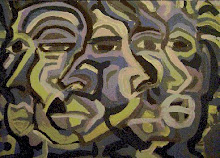 I'm a sinner - in every sense of the word. But I don't think that I'm a bad person.
I'm a sinner - in every sense of the word. But I don't think that I'm a bad person.I'd heard that one could learn patience by having to be patient - so, I thought that I could learn to be nice by doing nice things. (It didn't work.)
If forgiveness is given freely by the grace of GOD - what's the use of prayer and faith?
Didn't Plato argue in Republic that knowledge and faith were the same thing?
So what is faith?
 Is faith just a tool used by those in power to keep their power?
Is faith just a tool used by those in power to keep their power?Or is it a tool for those without power to gain new power?
I can buy neither opinion - but I can see the application of both (or each).
As faith in our institutions seems to be crumbling - the question becomes; "What next?".
In what are we supposed to believe?
If a child believes what his parents tells him - does the child have faith in his mother or father?
If the child has faith in his parents' teachings - does the child have knowledge?
If the knowledge is incorrect - what value is this supposed knowledge?
(Just because someone is said to "Know" something - this does not make such knowledge true.)
But what can we say for inspiration, or prescience, or instinct (or the generally accepted meaning of these words)?
 What causes someone to keep going when others quit?
What causes someone to keep going when others quit?Or when the popular theory is in opposition?
Or when doing so would seem counter intuitive?
I have some young cousins who were having problems in school and sports.
Their test grades were low and they were having problems playing in games up to their potential.
They would try their best on their tests and during games - but they kept coming up short.
Why?
Because they were playing (and studying) backwards. They were focusing on doing their best in the time of greatest struggle or stress.
The key in sports is; to work your hardest in practice - and then to just "play" during games.
In school the key is; to work your hardest in class and on homework - and then to just play around and show off what you've learned during the tests.
How do these examples relate to faith?
Because the knowledge of their work during their preparation frees them to relax and (almost) unconscious play during moments of greatest stress. Without the stress, they're free to leave worry to others. They don't have to believe that they're prepared - they'll know it (without "knowing" that they know it). Kind of a muscle-memory thing.
 Above is the example used in an earlier post. The image is meant to illustrate the point that -many people create an answer before they are asked the question.
Above is the example used in an earlier post. The image is meant to illustrate the point that -many people create an answer before they are asked the question.An example of this is seen in watching a batter trying to hit a fastball during a baseball game.
When does the batter begin his swing? No, not when the ball reaches the plate, not when the ball is is flight, but at the moment a pitcher releases the ball.
So how does a batter "know" where to swing?
Does he guess? Well ... the great hitters don't.
The great hitters would seem to "know" where a pitch is being thrown - even before it's thrown. Great hitters are able to "predict" the future in "seeing" the balls projected path.
Put this way - prescience sounds as though it could be universal (or common).
But this is definitely a "Ears to hear, eyes to see" situation.
Think of it as the scene in the Matrix where Neo seems suspended in mid-air and us seeing the whole interaction from an hundred different angles.
Can a man "slow" time down to more manageable increments?
Of course.
How many times during stressful situations has time seemed to creep by in slow motion?
It's as though you're having an out of body experience.
In sports it's often called "being in the zone" or "being unconscious".
That's the point where even the things you do wrong... seem to work out right.
But what does all this have to do with faith?
Well... I'm trying to point out that Plato was in fact correct in his assumption that faith is knowledge (Even if you are unaware of your using of such knowledge).
Imagine that you could see every color including ultraviolet, vacuum ultraviolet and infrared radiation.
Would your perspective of the world or causes of actions be different?
Would your ability to see more clearly be a benefit?
Are visions just a variation of such eyesight?
If this ability to have "Eyes to See" were possible - wouldn't what others see as faith really be your knowledge?
If prayer is a valid way of attaining this better than 20/20 vision - is it really faith at all?














8 comments:
It's work.
the only work that matters in the world...,
"I'd heard that one could learn patience by having to be patient - so, I thought that I could learn to be nice by doing nice things. (It didn't work.)"
Amen. lol
I know truly nice people. The kind that are interested in what you do, how you are, how your granny is doing. They smile all the time, never seem to have a bad day and find joy in all of the things that most of us take for granted.
Sigh.
I would like to be that person, but I'm not. 35 years of trying hasn't changed my inner cynic.
faith is a belief in things you cannot see, that are true. If practiced it can lead to knowledge.
the trick is realizing we will never get to the point of knowing everything, and just because you don't know something that doesnt mean the answer does not exist.
How about we just don't know! Why the absence of something someone always wants to fill it up with another theory. How about we don't know and since it's of no consequence to your normal life just live what you have in front of you.
Faith is a reaction to the unknown so it's usually filed with weird assumptions of GOD. Since we no one speaks to GOD they go and create interpretations probably from low blood sugar in their system.
what if someone does speak to God?
The important kwestin is whether God speaks back..., imoho - it's fairly commonplace for human beings to interact with non-human intelligences and occasionally, these intelligences will reciprocate.
It's rather preposterous for any of us to assume, given our rather paltry scale of being and development, that the non-human intelligences themselves are any more "God" than we at our scale are "God" when compared with a termite.
Anthropocentrism and superstition makes some folks crazy enough to lose all sense of proportion. I mean seriously, the most abundant biomass above, on, in, and under the earth is bacterial. Bacteria in their teeming supermasses have been here geological epochs longer than any other "species" and even in the context of our own paltry little organisms, they outnumber our cells by a factor of 10-1.
There are 10 times more bacteria on, in, and throughout your body as there are individual cells making up your body.
@Brohammas - If someone does speak to GOD then ask the important questions that will fix things not why the sun is hot, why the earth is round or why the cows go Moooo. If anyone can speak to the divine then let's better the world instead of asking why the moon reflects the earth.
So faith is a real knowledge even when you don't know why or how you "know" something?
What we call "instinst" could really be actual perceptions that we are unaware of?
Post a Comment